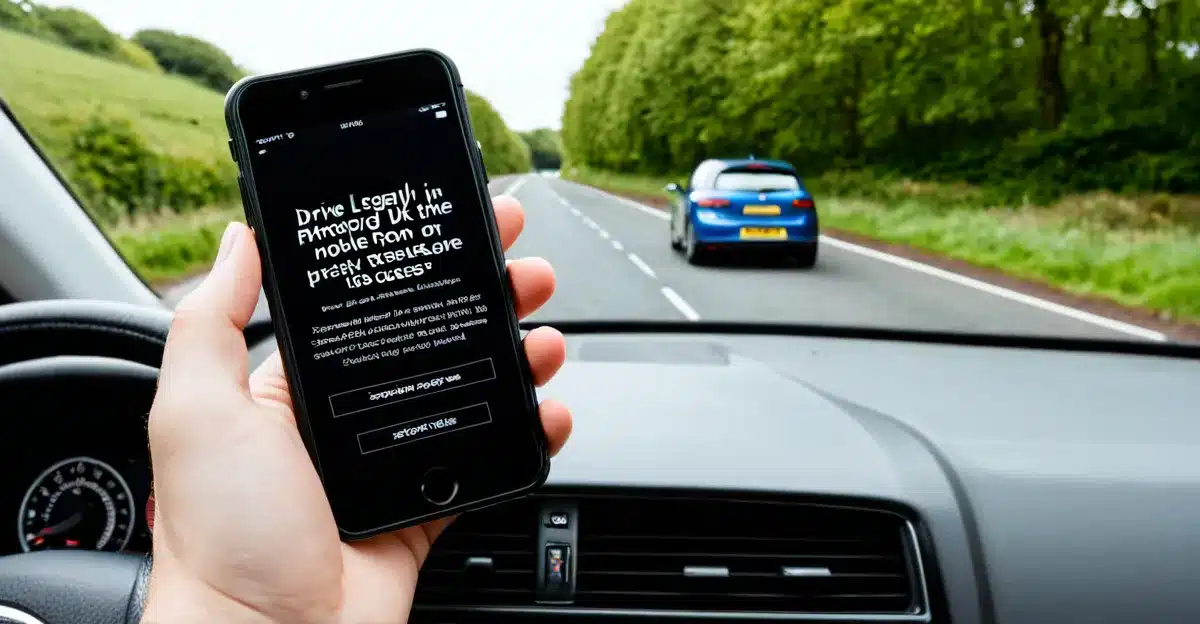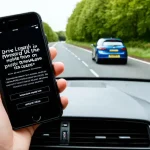Essential Update: Current UK Mobile Phone Laws While Driving
Keeping you informed on the latest legal changes
As of the 2024 legal update, UK mobile phone driving laws have become considerably stricter to improve road safety. The new UK driving law explicitly forbids drivers from holding a phone, even when stopped at traffic lights or in congestion. This means no calls, texts, or app interaction unless your device is hands-free and does not require manual input.
In the same genre : Discover the hidden techniques: extend your ev battery’s lifespan in the uk with pro tips
What is now legally allowed under the updated UK mobile phone driving laws? Drivers may use hands-free devices, such as Bluetooth headsets or built-in car systems, but the device must be secured and operated without touching. Using a phone for navigation is permitted only if set up before driving begins.
Strict prohibitions include actively holding a phone while driving, texting, or watching videos. Police have confirmed that these offenses will carry heavier fines and stricter penalties, including points on the license. Official government sources stress that compliance with these rules is mandatory for all drivers on UK roads.
Also read : Shield your car’s paint from the uk’s unpredictable weather: expert tips unveiled
Staying informed about this new UK driving law can help avoid fines and contribute to safer journeys for everyone.
Legal Consequences and Penalties for Mobile Phone Offences
Understanding the repercussions helps encourage safer habits.
In the UK, penalties for mobile phone use while driving are strict to deter distractions. Drivers caught using handheld phones face a minimum £200 fine and 6 licence points, immediately affecting their driving record. Accumulating 12 points within three years can lead to licence suspension, emphasizing the serious impact of these offences.
Beyond fines, being penalized for smartphone use while driving can inflate your insurance premiums significantly. Insurers often view these offences as indicators of risky behaviour, resulting in higher costs. In severe cases, mobile phone-related incidents might even appear on a criminal record if they cause accidents or endanger lives.
Notable cases, like drivers causing crashes due to phone use, demonstrate strict enforcement by UK authorities. These examples reveal that penalties extend beyond just fines, influencing personal and financial aspects of drivers’ lives. Recognizing these consequences underscores the importance of adhering to mobile phone laws while driving, protecting everyone on the road.
Practical Guidance for Complying with the Law
Ensuring safe and legal mobile phone use while driving
When it comes to legal mobile phone use in the UK, understanding the rules around hands-free driving is essential. The law permits drivers to use an approved hands-free device—such as Bluetooth headsets or dashboard-mounted phone holders—provided they do not manually hold or interact with the phone while driving. Setting up your device before you start driving helps prevent distractions and keeps you within the law.
Using your phone for navigation or music is allowed if these functions are set up in advance or controlled via voice commands. Emergency calls are also permitted, but be mindful to stay focused and safe. To avoid breaching the hands-free driving rules accidentally, refrain from picking up calls or texting when stopped temporarily, as the law applies whenever your vehicle is moving or stationary but not parked.
Staying compliant with mobile phone laws protects you from penalties and enhances road safety. Remember, even hands-free devices must be used responsibly to avoid distractions. Keeping your mobile use straightforward and pre-set ensures compliance while keeping you engaged with your driving environment.
Official Resources and Frequently Asked Questions
Staying informed with official government advice and police guidance is crucial when navigating mobile phone driving laws in the UK. The government provides clear, accessible resources that outline what is legal and what isn’t regarding mobile phone use while driving. These official channels answer numerous common doubts and offer practical advice on compliance.
Common mobile phone driving FAQs UK address questions such as: “Is hands-free use allowed?” and “What are the penalties for using a phone while driving?” The answers are straightforward: handheld use is illegal, while certain hands-free functions may be permissible, though drivers must not be distracted. Penalties can include fines and points on a driving licence.
To keep up with future changes in legislation, regularly consult government websites and police statements, which are updated promptly whenever laws evolve. This proactive approach not only ensures legal compliance but also enhances road safety. Relying solely on unofficial sources risks missing critical updates or misinterpreting the law.
For those seeking precise and current guidance, checking verified official resources is the best way to stay informed and avoid unintended violations.
Evaluating Robot Hoover Performance
Understanding how a robot hoover performs goes beyond simple specifications. Key metrics like suction power, battery life, and navigation accuracy determine its effectiveness. Buyers often ask: How does suction power impact cleaning? Suction power directly affects the robot’s ability to pick up debris, dust, and pet hair. Higher suction ensures deeper cleaning, especially on carpets.
Another common question is: What role does navigation technology play? Advanced navigation, such as lidar or camera-based systems, lets the robot map your home accurately. This means fewer missed spots and more efficient cleaning paths, reducing overall cleaning time.
Battery life is crucial for larger living spaces. Robots with longer battery cycles clean extensively without needing to recharge midway. Always check the run time if you have a spacious home.
In addition to technical specs, user feedback consistently highlights that maintenance ease and noise levels affect satisfaction. Quiet operation ensures minimal disruption, while simple dustbin removal streamlines upkeep.
By considering these factors—suction power, navigation technology, battery life, and user-friendly features—you can select a robot hoover tailored to your home’s cleaning needs.



